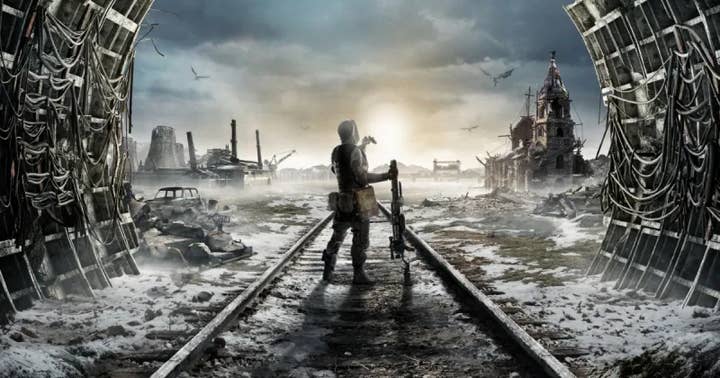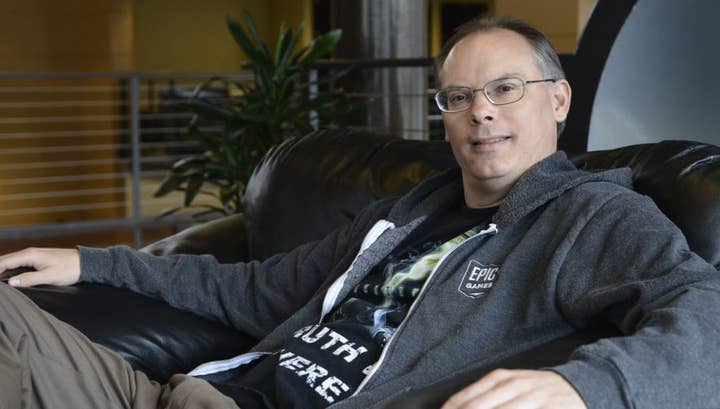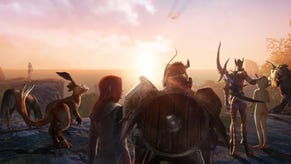Epic Games Store is making the industry better but “gamers don't see that”
CEO Tim Sweeney addresses backlash against exclusivity deals, promises human curation to block “shock controversy games” like Rape Day
It must have been satisfying for Epic Games to see the PC sales figures for Metro Exodus.
The post-apocalyptic shooter was arguably the first major new release for the Epic Games Store, and certainly the first high-profile exclusive. The company proudly declared during its GDC keynote that Metro Exodus sold more than 2.5 times the amount its predecessor Metro Last Light did through Steam.
As we observed earlier this week, there are limits to how much this tells us about how well the store has been established, but at the very least it proves Epic is doing something right. In fact, CEO Tim Sweeney tells us the game performed, "way beyond our expectations."
"A critical challenge from the beginning has been looking at projects on Steam and asking how we can achieve those levels of success on our store," he says. "Metro Exodus far exceeded even Steam projections in sales, and this really proves that it's about the games, not about the stores."

But for some in the PC gaming community, it is very much about the stores. Metro Exodus' exclusivity deal provoked the ire of devoted Steam fans, who have complained and even resorted to the usual tactic of review bombing the previous Metro games on Valve's store.
It's not the only example, either. Snapshot Games was also criticised for making its upcoming strategy game Phoenix Point temporarily exclusive to the Epic Games Store.
When asked for his take on these reactions, Sweeney reiterated the aim of the Epic Games Store is, "breaking the 70/30 stranglehold that's pervaded the industry for more than a decade," and that its methods in doing so were never going to please everyone.
"Changing the way that games are sold is a big disruption to everybody," he says. "I understand that -- I've personally unsubscribed from Netflix twice as their selections of movies changed. But this is a necessary step forward for the games industry if we want to enable developers to invest in building better games, and if we want the savings to ultimately be passed on to gamers in the form of better prices.
"Ultimately, this is about making the industry a better place, starting with the terms available for developers. I understand gamers don't see that. They don't see the hardship of making a payroll and seeing the store suck out 30% of the revenue from it. It can be jarring to see the industry is changing in ways that are typically invisible to us as gamers."
"Gamers don't see the hardship of making a payroll and seeing the store suck out 30% of the revenue from it"
Epic isn't about to hold back on those exclusivity deals. At this week's keynote alone, it announced an expanded partnership with Ubisoft (although it's been left to the Assassin's Creed publisher to share details), plus exclusives from Take-Two label Private Division and the rights to the PC debut of Quantic Dream's PlayStation titles.
It's worth noting these exclusives aren't technically exclusive any more, with Epic partnering with Humble Bundle to enable all games to be sold on the Humble Store as well. Sweeney says Epic is also open to, "working with other highly reputable stores to enable more options as well," although this is unlikely to instantly quell the frustration that has been growing among certain Steam users over the past few months.
The CEO adds: "It's important for game developers to hold strong and sometimes be willing to go through criticism as we do things that are necessary for the industry."

With such strong support from developers and publishers after the first three months, Epic Games is confident it can win over more partners -- even those, like Electronic Arts, who are trying to establish their own stores.
"The key for them is they want a direct relationship with their customers and a fair share of the revenue from their games," Sweeney says. "They build their own ecosystems because they felt they weren't getting the deal they deserved on Steam.
"The world deserves lots of stores. It's all very healthy for the industry to see lots of competition on lots of different fronts. Just look at all the gamers who installed Origins for the first time to play Apex Legends, all the Korean gamers who probably installed Steam for the first time to play PlayerUnknown's Battlegrounds. Great games drive stores."
"[Curation] needs to be a human process that takes quality into account so the customers can trust us to supply good games"
It turns out free games also drive stores, as Epic announced its first free offering -- Unknown Worlds' Subnautica -- was downloaded more than 4.5 million times during the two-week promotion, and Monomi Park's Slime Rancher is currently on track to beat it.
"The free games have been a huge success, much bigger than expected," says Sweeney. "We've gone around working with game developers and paid them for the opportunity to release their games for free for two weeks. That's brought in a huge number of new gamers.
"The wonderful thing is we're bringing in new gamers to the Epic Games Store more economically than we would if we paid Facebook or Google for ads. Instead of ads, free games are driving the store forward."
Sweeney is keen to get as many titles onto the Epic Games Store as possible, but this ambition is still tempered by the desire to offer a high-quality catalogue. Given the recent controversy over visual novel Rape Day and Valve's slow response, the Epic CEO is quick to assure such a title will never appear on his store.
"We are going to maintain a reasonable quality standard for games," he says. "It'll be open to games of all sizes, but not the junky asset flips or shock controversy games that are built just to make noise. PC is an open platform; there are lots of stores, so I don't feel like any particular store has a moral obligation to carry low quality or highly controversial projects."
Does this mean the Epic Games Store will have a greater focus on curation than Valve's marketplace, with more effort placed on monitoring what developers submit?
"Absolutely," Sweeney concludes. "This needs to be a human process that takes quality into account so the customers can trust us to supply good games."









